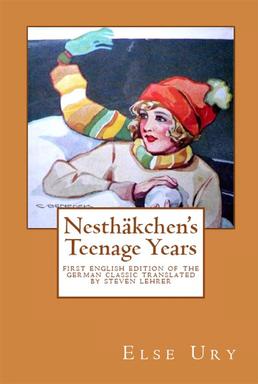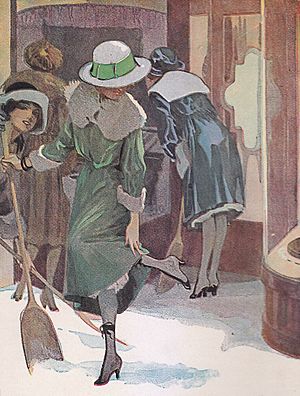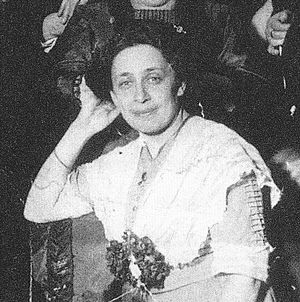Nesthäkchen's Teenage Years facts for kids
 |
|
| Author | Else Ury |
|---|---|
| Original title | Nesthäkchens Backfischzeit |
| Translator | Steven Lehrer |
| Illustrator | Robert Sedlacek |
| Country | US |
| Language | English |
| Series | Nesthäkchen, volume 5 |
| Genre | Fiction/Adventure |
| Publisher | SF Tafel |
|
Publication date
|
2016 |
| Media type | |
| Pages | 312 pp (Trade Paper edition) |
| ISBN | 978-1523476800 |
| Preceded by | Nesthäkchen and the World War |
| Followed by | Nesthäkchen Flies From the Nest |
Nesthäkchen’s Teenage Years is the fifth book in the popular Nesthäkchen series by Else Ury. This series follows the life of Annemarie Braun, a doctor's daughter from Berlin, Germany. The books tell Annemarie's story from when she was a baby all the way to her old age. This particular book, first published in 1919, focuses on Annemarie's life as a teenager.
Contents
Annemarie's Teenage Adventures
The German word Backfisch means "teenage girl." It literally translates to "fish for frying." This book shows Annemarie's teenage years, specifically between 1919 and 1922. This was a time of big changes in Germany after World War I.
Annemarie is almost 16 years old when the story begins. She and her friends, Vera, Marlene, and Ilse, go to a high school. Annemarie is a strong-willed girl. When she feels her German teacher treats her unfairly, she tries to start a student council. This causes some trouble with the school's director. Even though her actions put her education at risk, she still manages to move up to her final year.
Challenges During Tough Times
Annemarie's 16th birthday party faces a challenge. A power cut happens because of an economic blockade. This blockade completely shuts down the electricity and phone lines.
Later, Annemarie visits her relatives on a farm in Silesia. This region is now part of Poland. She has to rush back home because Polish troops are occupying Upper Silesia. On her way, she gets stuck in the town of Sagan due to a railway strike. (In newer versions of the book, she gets stuck in Nuremberg because of a general strike and lack of coal.)
Becoming a Nanny
To earn some money, Annemarie takes a job as a nanny for a doctor's family named Lange. The Langes soon realize that Annemarie is a very educated girl. She knows Latin, cares about how she looks, knows about famous paintings, and reads books by authors like Selma Lagerlöf.
When her true identity is revealed, Dr. Lange discovers he went to Heidelberg University with Annemarie's father. The Langes then treat Annemarie like their own daughter until she can return to Berlin.
Facing Illness and Graduation
In the winter of 1919, there is a big shortage of coal. Also, a serious flu outbreak spreads. Annemarie tries to find coal for her family but cannot. Eventually, she gets sick herself.
The book ends with Annemarie's high school graduation. She and her friend Marlene do very well on their written tests. They even get to skip the final oral exam. Even though these were hard times, Else Ury's funny writing style makes the story enjoyable.
What Kind of Book Is It?
The Nesthäkchen books belong to a German type of story called a Backfischroman. This means a "girls' novel." These books were popular between 1850 and 1950. They usually told stories about girls growing up and learning about society's rules. The main character often ended up getting married and becoming a homemaker.
Else Ury first planned to end the Nesthäkchen series with the sixth book, Nesthäkchen Flies From the Nest, which describes Annemarie's marriage. However, her publisher received many letters from young fans. They begged for more Nesthäkchen stories! So, Else Ury wrote four more books. She even mentioned her doubts about continuing the series in the seventh book, Nesthäkchen and Her Chicks.
About the Author, Else Ury
Else Ury (born November 1, 1877, in Berlin) was a German writer. She is best known for creating Annemarie Braun and the Nesthäkchen series. These ten books tell Annemarie's life story from childhood to old age. The books, along with a six-part TV show from 1983, have been enjoyed by millions of people. Else Ury passed away on January 13, 1943, during a very difficult time in history.
 | Georgia Louise Harris Brown |
 | Julian Abele |
 | Norma Merrick Sklarek |
 | William Sidney Pittman |



